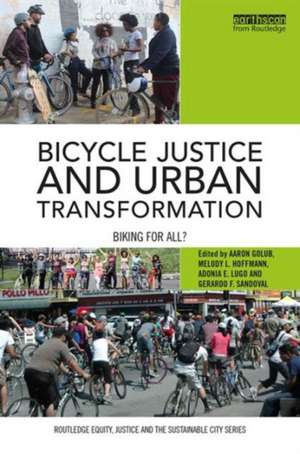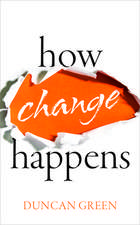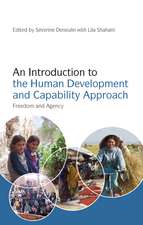Bicycle Justice and Urban Transformation: Biking for all?: Routledge Equity, Justice and the Sustainable City series
Editat de Aaron Golub, Melody Hoffmann, Adonia Lugo, Gerardo Sandovalen Limba Engleză Hardback – 4 iul 2016
Bicycle Justice and Urban Transformation demonstrates that for those with privilege, bicycling can be liberatory, a lifestyle choice, whereas for those surviving at the margins, cycling is not a choice, but an often oppressive necessity. Ignoring these "invisible" cyclists skews bicycle improvements towards those with choices. This book argues that it is vital to contextualize bicycling within a broader social justice framework if investments are to serve all street users equitably. "Bicycle justice" is an inclusionary social movement based on furthering material equity and the recognition that qualitative differences matter.
This book illustrates equitable bicycle advocacy, policy and planning. In synthesizing the projects of critical cultural studies, transportation justice and planning, the book reveals the relevance of social justice to public and community-driven investments in cycling. This book will interest professionals, advocates, academics and students in the fields of transportation planning, urban planning, community development, urban geography, sociology and policy.
Din seria Routledge Equity, Justice and the Sustainable City series
-
 Preț: 261.33 lei
Preț: 261.33 lei -
 Preț: 155.44 lei
Preț: 155.44 lei -
 Preț: 269.43 lei
Preț: 269.43 lei -
 Preț: 279.69 lei
Preț: 279.69 lei -
 Preț: 309.99 lei
Preț: 309.99 lei -
 Preț: 437.71 lei
Preț: 437.71 lei -
 Preț: 490.62 lei
Preț: 490.62 lei -
 Preț: 489.30 lei
Preț: 489.30 lei - 15%
 Preț: 420.82 lei
Preț: 420.82 lei -
 Preț: 416.22 lei
Preț: 416.22 lei -
 Preț: 428.67 lei
Preț: 428.67 lei - 34%
 Preț: 936.51 lei
Preț: 936.51 lei -
 Preț: 384.86 lei
Preț: 384.86 lei -
 Preț: 341.92 lei
Preț: 341.92 lei -
 Preț: 384.86 lei
Preț: 384.86 lei -
 Preț: 373.87 lei
Preț: 373.87 lei -
 Preț: 382.18 lei
Preț: 382.18 lei -
 Preț: 348.39 lei
Preț: 348.39 lei -
 Preț: 288.15 lei
Preț: 288.15 lei -
 Preț: 389.66 lei
Preț: 389.66 lei - 18%
 Preț: 1001.84 lei
Preț: 1001.84 lei
Preț: 1057.89 lei
Preț vechi: 1290.10 lei
-18% Nou
Puncte Express: 1587
Preț estimativ în valută:
202.49€ • 220.02$ • 170.20£
202.49€ • 220.02$ • 170.20£
Carte tipărită la comandă
Livrare economică 21 aprilie-05 mai
Preluare comenzi: 021 569.72.76
Specificații
ISBN-13: 9781138950245
ISBN-10: 1138950246
Pagini: 294
Ilustrații: 66
Dimensiuni: 156 x 234 x 22 mm
Greutate: 0.54 kg
Ediția:1
Editura: Taylor & Francis
Colecția Routledge
Seria Routledge Equity, Justice and the Sustainable City series
Locul publicării:Oxford, United Kingdom
ISBN-10: 1138950246
Pagini: 294
Ilustrații: 66
Dimensiuni: 156 x 234 x 22 mm
Greutate: 0.54 kg
Ediția:1
Editura: Taylor & Francis
Colecția Routledge
Seria Routledge Equity, Justice and the Sustainable City series
Locul publicării:Oxford, United Kingdom
Public țintă
PostgraduateCuprins
1. Introduction: Creating an Inclusionary Bicycle Justice Movement 2. Is the right to bicycle a civil right? Synergies and tensions between the transportation justice movement and planning for bicycling 3. Is Portland’s Bicycle Success Story a Celebration of Gentrification? A theoretical and statistical analysis of bicycle use and demographic change 4. Freedom of movement / Freedom of choice: An enquiry into utility cycling and social justice in post-apartheid Cape Town, 1994-2015 5. Advocating Through Data: Community Visibilities in Crowdsourced Cycling Data 6. Advancing discussions of cycling interventions based on social justice 7. Theorizing Bicycle Justice Using Social Psychology: Examining the Intersection of Mode and Race with the Conceptual Model of Roadway Interactions 8. Delivering (in)Justice: Food Delivery Cyclists in New York City 9. Rascuache Cycling Justice 10. No Choice But to Bike: Undocumented and bike-dependent in rust belt America 11. Aburrido! Cycling on the U.S./Mexican Border with Doble Rueda Bicycle Collective in Matamoros, Tamaulipas 12. Civil Bikes: Embracing Atlanta’s racialized history through bicycle tours 13. Decentering Whiteness in Organized Bicycling: Notes from Inside 14. Community Bicycle Workshops and "Invisible Cyclists" in Brussels 15. Community Disengagement: The Greatest Barrier to Equitable Bike Share 16. No Hay Peor Lucha Que La Que No Se Hace: Re-negotiating cycling in a Latino community 17. Collectively Subverting the Status Quo at the Youth Bike Summit 18. Mediating the ‘White Lanes of Gentrification’ in Humboldt Park: Community-Led economic development and the struggle over public space
Notă biografică
Aaron Golub is Associate Professor in the Nohad A. Toulan School of Urban Studies and Planning at Portland State University, Oregon, USA.
Melody L. Hoffmann is a mass communication instructor at Anoka Ramsey Community College near Minneapolis, Minnesota, USA.
Adonia E. Lugo is an urban anthropologist and co-founder of the Bicicultures network, USA.
Gerardo F. Sandoval is Associate Professor at the Department of Planning, Public Policy and Management and the Co-Director of the Center for Latino/a and Latin American Studies at the University of Oregon, USA.
Melody L. Hoffmann is a mass communication instructor at Anoka Ramsey Community College near Minneapolis, Minnesota, USA.
Adonia E. Lugo is an urban anthropologist and co-founder of the Bicicultures network, USA.
Gerardo F. Sandoval is Associate Professor at the Department of Planning, Public Policy and Management and the Co-Director of the Center for Latino/a and Latin American Studies at the University of Oregon, USA.
Recenzii
"Bicycle justice has become a major concern in the US. This group of authors provides an impressive array of case studies on bicycle justice and the overlooked or invisible riders creating bicycle advocacy and planning. These bike advocates promote more transportation choices for everyone while the transportation justice advocates demand that bicycling and all forms of transportation be understood as a civil rights issue." – Glenn S. Johnson, Associate Dean for Research and Graduate Studies, Texas Southern University, Barbara Jordan Mickey Leland School of Public Affairs, Houston, Texas, USA
"This book may indeed help start a movement for inclusive, equitable bicycle justice. Grounded in clear thinking and strong examples, this unique collection offers a probing assessment of both the tendency to stereotype "deserving" bicyclists, marginalizing others, and the patently inequitable distribution of public investments in bicycle infrastructure." – June M. Thomas, Centennial Professor, Taubman College of Architecture and Urban Planning, The University of Michigan, USA
"Postgraduates and academics will find this book rich and informative. This book would also serve as an excellent source for a course on urban transport justice".
Cyrille Médard de Chardona,Université du Luxembourg, Local Environment The International Journal of Justice and Sustainability
"This book may indeed help start a movement for inclusive, equitable bicycle justice. Grounded in clear thinking and strong examples, this unique collection offers a probing assessment of both the tendency to stereotype "deserving" bicyclists, marginalizing others, and the patently inequitable distribution of public investments in bicycle infrastructure." – June M. Thomas, Centennial Professor, Taubman College of Architecture and Urban Planning, The University of Michigan, USA
"Postgraduates and academics will find this book rich and informative. This book would also serve as an excellent source for a course on urban transport justice".
Cyrille Médard de Chardona,Université du Luxembourg, Local Environment The International Journal of Justice and Sustainability
Descriere
This book provides the standards for equitable bicycle advocacy, policy, and planning by defining and operationalizing bicycle justice. In synthesizing the projects of critical cultural studies, transportation justice, and planning as applied practice, this book reveals the relevance of civil rights and social justice concerns to public interventions intended to increase cycling.















